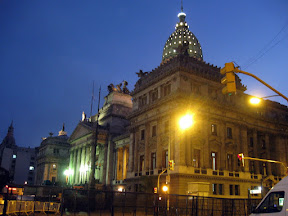Alfonsín was not a saint and his period of governance is marked by failures, from the aforementioned crisis of hyperinflation which he failed to ameliorate to the serious concessions he granted former junta leaders, including amnesty for war criminals, after facing threats and pressure from military powerbrokers. However, unlike many of his predecessors and followers, Alfonsín was honest. When the talk of the town centers upon favorable deals the Kirchners have awarded themselves and the ongoing corruption scandals of President Carlos Menem, when the society lacks a strong sense of social democracy and faith in their democratic institutions, this unique feature of Alfonsín is particularly meaningful.
Upon finding out that Alfonsín had died, my host mother bestowed the highest compliment she could pay: Alfonsín, she said, was the only living president of Argentina who could walk through the streets without having eggs thrown at them or being spat at. She withheld the four-letter-words with which she usually labels her elected officials. For the first time, I heard her cynicism replaced with respect.
Clearly, Silvia was not the only one. Tuesday at midnight my friend Beth and I walked to Alfonsín’s home at Santa Fé and Rodriguez Peña where there was a sizeable gathering. Acknowledging the solemnity, I did not take photos. I did however take photos of the huge crowd outside of Congreso, the Argentine capitol building, waiting to pay respects at Alfonsín open-casket wake the next day.
| Lines wrapping around themselves in coils of four stretched four blocks from Rivadavía and Callao until Sarmiento, then as a solid line to Corrientes. Sporadically, these large groups would break into claps of “Al-fon-sín,” which seemed to help along the several hours wait of the after-work crowd. I saw plenty of flowers, many teary eyes, and lots of folks wrapping themselves in Argentine flags. Many were supporters of UCR, to be sure, but I am certain that many Judicialist Party (Peronist) members stood among their ranks, in an appropriate stand of democratic solidarity. |
Although I experienced them, I did not write about the Day of Human Rights or the Mother of Plaza del Mayo, who march every Thursday to honor their disappeared, but I will acknowledge them now. In the midst of cosmopolitan, modern Buenos Aires, it’s sometimes easy to not see Argentina’s tragic and all-too-recent past. Alfonsín’s transition of power to Menem is considered the embodiment of the consolidation of Argentine democracy and his death is a poignant reminder that Argentine democracy, both politically and institutionally, still has much more to grow.
For more reading on the subject, I suggest the flattering NY Times obit and today’s similarly-themed article, “Argentina Mourns Raul Alfonsin, an Honest Leader.” In Spanish: Clarín’s obit.




No comments:
Post a Comment